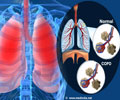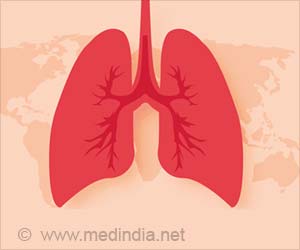Nutrients possessing anti-inflammatory properties like omega 3 fatty acids have the potential to support and preserve optimal lung health.

Investigating Associations of Omega-3 Fatty Acids, Lung Function Decline, and Airway Obstruction
Go to source). The study provides the strongest evidence to date of this association and underscores the importance of including omega-3 fatty acids in the diet, especially given that many Americans do not meet current guidelines. Funded largely by the National Heart, Lung, and Blood Institute (NHLBI), part of NIH, the study results were published in the American Journal of Respiratory and Critical Care Medicine.
‘A link was identified between increased levels of omega-3 fatty acids in an individual's bloodstream and a decreased rate of decline in lung function. #omega3 #lunghealth’





“We know a lot about the role of diet in cancer and cardiovascular diseases, but the role of diet in chronic lung disease is somewhat understudied,” said corresponding author Patricia A. Cassano, Ph.D., director of the Division of Nutritional Sciences at Cornell University in Ithaca, New York. “This study adds to growing evidence that omega-3 fatty acids, which are part of a healthy diet, may be important for lung health too.” There’s increased interest in trying to understand whether nutritional interventions could contribute to lung disease prevention efforts. Past studies have suggested that omega-3 fatty acids may help, due largely to their established anti-inflammatory actions. However, robust studies of this association have been lacking, until now.
Vital Role of Omega-3 Fatty Acids in Lung Health
To learn more, researchers developed a two-part study investigating the link between omega-3 fatty acid levels in the blood and lung function over time. In the first part, the researchers conducted a longitudinal, observational study involving 15,063 Americans from the NHLBI Pooled Cohorts Study (2✔ ✔Trusted SourceHarmonization of Respiratory Data From 9 US Population-Based Cohorts
Go to source) — a large collection of NIH-funded studies that helps researchers to study determinants of personalized risk for chronic lung disease.
The participants studied were generally healthy when the study began, and the majority had no evidence of chronic lung disease. They comprised a racially diverse group of adults, with an average age of 56 years, and 55% were female. The researchers followed participants for an average of seven years and up to 20 years.
The researchers observed the strongest associations for docosahexaenoic acid (DHA), an omega-3 fatty acid that is found at high levels in fatty fish such as salmon, tuna, and sardines. DHA is also available as a dietary supplement.
In the second part, the researchers analyzed genetic data from a large study of European patients (over 500,000 participants) from the UK Biobank. They studied certain genetic markers in the blood as an indirect measure, or proxy, for dietary omega-3 fatty acid levels to see how they correlated with lung health. The results showed that higher levels of omega-3 fatty acids — including DHA — were associated with better lung function.
Advertisement
COPDGene
Go to source). to examine blood levels of omega-3 fatty acids in relation to the rate of decline in lung function among people with chronic obstructive pulmonary disease or COPD (4✔ ✔Trusted Source
What is COPD
Go to source). — including heavy smokers — to determine if the same beneficial associations are found.
“We’re starting to turn a corner in nutritional research and really moving toward precision nutrition for treating lung diseases,” said study first author Bonnie K. Patchen, Ph.D., a nutritionist and member of Cassano’s research team at Cornell. “In the future, this could translate into individualized dietary recommendations for people at high risk for chronic lung disease.”
Omega-3 Sources: Meeting Dietary Guidelines for Optimal Health
For now, the researchers point out that the U.S. Department of Agriculture’s Dietary Guidelines (5✔ ✔Trusted SourceAdvice about Eating Fish
Go to source) for Americans recommends that people eat at least two servings of fish per week, which most Americans fall far short. In addition to fish and fish oil, other sources of omega-3 fatty acids (6✔ ✔Trusted Source
Omega-3 Fatty Acids
Go to source) include nuts and seeds, plant oils, and fortified foods.
References:
- Investigating Associations of Omega-3 Fatty Acids, Lung Function Decline, and Airway Obstruction - (https://www.atsjournals.org/doi/10.1164/rccm.202301-0074OC)
- Harmonization of Respiratory Data From 9 US Population-Based Cohorts - (https://pubmed.ncbi.nlm.nih.gov/29982273/)
- COPDGene - (https://www.copdgene.org/)
- What is COPD - (https://www.nhlbi.nih.gov/health/copd)
- Advice about Eating Fish - (https://www.fda.gov/food/consumers/advice-about-eating-fish)
- Omega-3 Fatty Acids - (https://ods.od.nih.gov/factsheets/Omega3FattyAcids-Consumer/)















